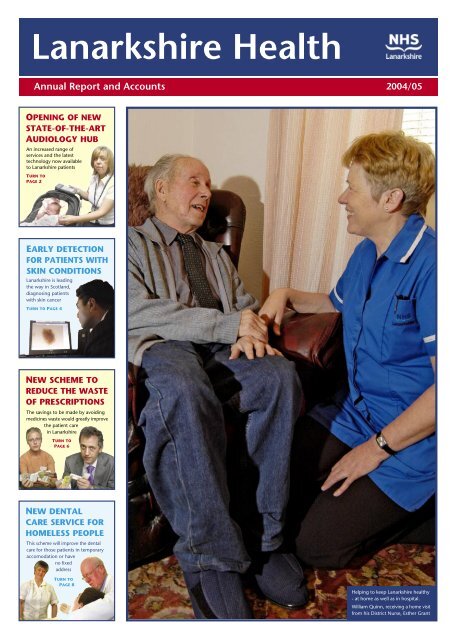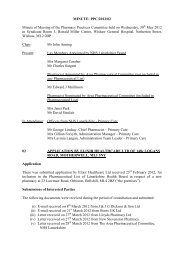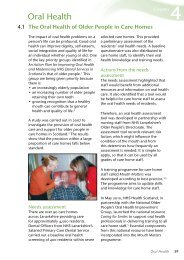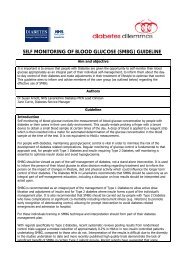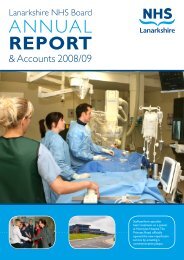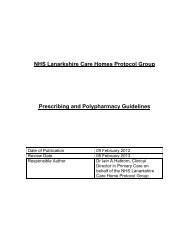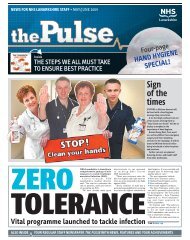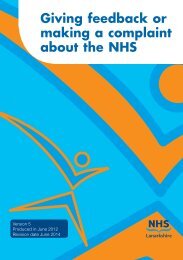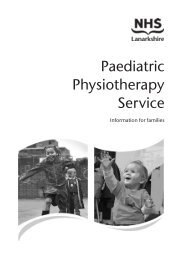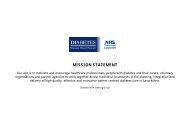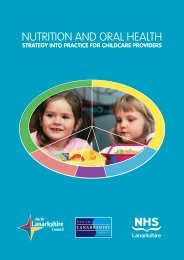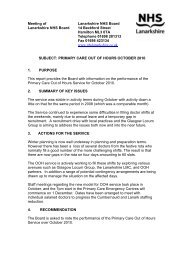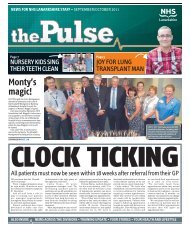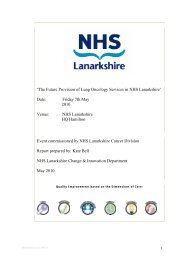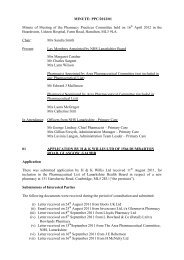Annual Report 2004 - NHS Lanarkshire
Annual Report 2004 - NHS Lanarkshire
Annual Report 2004 - NHS Lanarkshire
You also want an ePaper? Increase the reach of your titles
YUMPU automatically turns print PDFs into web optimized ePapers that Google loves.
<strong>Lanarkshire</strong> Health<strong>Annual</strong> <strong>Report</strong> and Accounts <strong>2004</strong>/05OPENING OF NEWSTATE-OF-THE-ARTAUDIOLOGY HUBAn increased range ofservices and the latesttechnology now availableto <strong>Lanarkshire</strong> patientsTURN TOPAGE 2EARLY DETECTIONFOR PATIENTS WITHSKIN CONDITIONS<strong>Lanarkshire</strong> is leadingthe way in Scotland,diagnosing patientswith skin cancerTURN TO PAGE 4NEW SCHEME TOREDUCE THE WASTEOF PRESCRIPTIONSThe savings to be made by avoidingmedicines waste would greatly improvethe patient carein <strong>Lanarkshire</strong>TURN TOPAGE 6NEW DENTALCARE SERVICE FORHOMELESS PEOPLEThis scheme will improve the dentalcare for those patients in temporaryaccomodation or haveno fixedaddressTURN TOPAGE 8Helping to keep <strong>Lanarkshire</strong> healthy- at home as well as in hospital.William Quinn, receiving a home visitfrom his District Nurse, Esther Grant
<strong>Annual</strong> <strong>Report</strong> and Accounts <strong>2004</strong>/05<strong>Lanarkshire</strong> Health 3<strong>Lanarkshire</strong> pupils with something to SMILE aboutLOCAL school pupils gottogether to name theirinnovative youth smokingcessation service.Pupils at Hunter High School in EastKilbride came up with the project nameSMILE to encourage young people to thinkabout what smoking does to their image.They also designed a logo with help from<strong>Lanarkshire</strong> graphics company Scotch Pie.SMILE is aimed at young people aged12-18 in the East Kilbride, Hamilton,Airdrie & Coatbridge areas. Youth smokingcessation co-ordinators Celia Watt andAlec Ward visit local schools, youth centresand community venues to provide supportand information.The project has secured funding for two yearsfrom the Big Lottery Fund and is a multiorganisationalapproach through voluntaryorganisations and local authority areas suchas education, social and leisure services.Peer education is also a main part of theSMILE quit programme and young peopletalk to each other about the health risksof smoking. Additionally, the project willoffer a range of therapies such as dramaand music to help young people to stopsmoking or discourage them from starting.Nicotine Replacement Therapy (NRT) isprescribed to young people aged over 14where other options have been unsuccessful.NRT is only given to young people afterconsultation with a health professional.Celia Watt, youth smoking cessationco-ordinator said:“The competition has brought smoking andsmoking cessation to the forefront of the mindsof those attending and working within theschools. The project has a name and logo thatis eye-catching and appeals to young people.The winners chose SMILE because it portrayshealth, well being and refers to the benefitsof quitting smoking for oral health. SMILEalso raises awareness of the fact that aperson’s image can be affected by smoking.Front Row (left to right): Emma Gibb (Hamilton Grammar) - Runner up; Daniel Lennon(John Ogilvie, Hamilton) - Runner Up; Julie McGuire - Scotch Pie Design Company; Celia Watt- Youth Smoking Cessation Co-ordinator, <strong>NHS</strong> <strong>Lanarkshire</strong>; Marcus McGuire - Scotch PieDesign Company; Courtney Ladds and Scott Leddie - Hunter High School, East KilbrideBack Row (left to right): Keith Forsyth, Elidh Stevenson, Nicola McGlashan, HannahThomas and Michael Williamson from Hunter High School, East KilbrideExtra supportto help kickthe habitWHEN it comes to stubbingout the cigarettes, hospitalvolunteer Nettie Creswellknows just how hard it can be.Which is why Nettie has become the latestrecruit to the smoking cessation service atMonklands Hospital.Nettie, who lives in Coatbridge, is the firstvolunteer to work with the service as a peersupporter and offers help and advice topatients who are trying to quit.Smoking cessation specialist nurseCatherine Burke introduces Nettie topatients in the hospital who want tostop smoking and once they leavehospital Nettie will keep in touchto give them the extra support andencouragement that smokers needto kick the habit for good.Nettie (72) said:“I have a list of patients and I just givethem a wee call to see how they aregetting on. It’s a great feeling whenthey stay off the cigarettes but it canbe disappointing if they don’t -but I can get away with saying thingsto them that Catherine can’t!”Nettie, who had smoked for morethan 50 years, gave up smoking aftersuffering a slight stroke and she andher husband both came along to thesmoking cessation service togetherto try and give up.SMOKING CESSATIONTHROUGHOUT the year <strong>NHS</strong> <strong>Lanarkshire</strong> stepped up its work in smoking cessationas part of Scotland’s preparations for a total ban on smoking in public places.At Wishaw General a buddy supportscheme was set up to help patients kickthe habit, a scheme which won praisefrom the Health Minister Andy Kerr.Led by Smoking Cessation SpecialistNurse Jean Girvan the service has justtaken on a team of volunteers.The volunteers will act as buddies topatients who want to give up smoking,offering moral support and sharedexperience to help them throughtheir cravings.Nettie is pictured with Catherine Burke(right) and Jacqui Braidwood fromMonklands smoking cessation service.Once Jean has initially assessed a patient thevolunteers will then visit them in the wardand provide telephone support to them atleast once a week to find out how they arecoping without cigarettes following discharge.<strong>NHS</strong> <strong>Lanarkshire</strong>’s Smoking CessationService has also developed a training coursefor all staff in the organisation to help themgive their patients brief advice on quittingsmoking. It is the first course of its kindin Scotland to gain Partnership Action onTobacco and Health (PATH) approval.Tobacco use is the single biggest preventablecause of ill health and premature death inScotland and is a major cause of inequalitiesin health. In Scotland 13,000 people dieevery year from tobacco related diseasesincluding heart disease and many cancers.<strong>NHS</strong> <strong>Lanarkshire</strong> also launched the firstproject in the area to help pregnantwomen to stop smoking.The Cross-<strong>Lanarkshire</strong> Action on Smokingin Pregnancy (CLASP) project helps womenquit smoking during pregnancy by offeringa buddy scheme.Left to right:Kathleen Tierney,Health Visitor,Bellshill Clinic;Cathy Murphy,Midwife, BellshillClinic; Janice Kean,CLASP Buddy;Anne MacDonald,Smoking CessationCo-ordinatorBuddies are volunteer ex-smokers whohave stopped smoking for at leastone year. They are available to offera friendly, non-judgemental ear withassurance of confidentiality and support.Pregnant women who want to stopsmoking can use one-to-one supportin person or over the telephone.More information is available frommidwives, GPs, health visitors, practicenurses or smoking cessation co-ordinators.The benefits for baby include a reducedrisk of cot death, better growth, lessrisk of chest complaints like asthma,fewer ear infections and improvedbrain development.Mothers will benefit from a healthierpregnancy, healthier heart and lungsand more money for the new baby.The project is supported by Partnershipon Tobacco and Health (PATH) which ispart of a national strategy to encouragemore people in Scotland to stop smoking.
4 <strong>Lanarkshire</strong> Health<strong>Annual</strong> <strong>Report</strong> and Accounts <strong>2004</strong>/05WORKING TOGETHER FORA HEALTHIER LANARKSHIREExtracts fromthe <strong>Report</strong> of theDirector of Public Healthby Dr Dorothy C Moir, CBEForewordPublic health has been defined as the“science and art of preventing disease,prolonging life and promoting healththrough the organised efforts of society”.Key to this endeavour is the analysis andinterpretation of data about the health ofthe population drawn from an increasingand varied number of sources, which helpsto clarify priorities for targeted action toimprove health in <strong>Lanarkshire</strong>. This year’sreport provides many examples.Public health skills are increasingly indemand and I extend my special thanks toall staff in public health who are committedto promoting, maintaining and improvingthe health of the people of <strong>Lanarkshire</strong>.I am also grateful to clinical colleaguesfor their support and to colleagues in thelocal authorities for their co-operation andsupport, and to those service users and theircarers who provide insights that influenceservice developments.A full version of Dr Moir’s report can beseen on the <strong>NHS</strong> <strong>Lanarkshire</strong> website at:www.nhslanarkshire.org.ukOr can be obtained from:The Department of Public Health<strong>NHS</strong> <strong>Lanarkshire</strong>14 Beckford Street, Hamilton ML3 0TAHealth improvementHealth of the People of <strong>Lanarkshire</strong>Coronary heart disease mortality under the age of 75 is steadily decreasing in<strong>Lanarkshire</strong> although <strong>Lanarkshire</strong> deaths from coronary heart disease in this age groupare 17% higher than Scotland as a whole. Cancer mortality under the age of 75 isdecreasing very slowly with little improvement in the last five years.Smoking is the single biggest cause of preventable illness and premature death inScotland. The prevalence of smoking among 16-64 year olds and in pregnant womenis declining gradually.Health PromotionMotivating and encouraging individuals to adopt more healthy behaviours is animportant part of the overall effort to improve the health of the population. Whilemuch of the visible effort to encourage healthier lifestyles takes place through mediacampaigns and public debate, one-to-one interventions with patients/people byfrontline staff can help individuals to make relevant lifestyle changes.Promoting health in the community also has an important role and a men’s weightreduction service in Coatbridge, an area with high cardiovascular morbidity,is a good example of this.PharmaceuticalPublic HealthThe ability of health care to improvehealth is dependent on several factorsincluding prescription of appropriatemedication. Prescribing of genericmedicines, using the approved namerather than brand names, generallyresults in more cost-effective prescribingand has helped to reduce the rate atwhich the expenditure on medicineshas been increasing year on year.While many see such services withintheir community as a threat, it isimportant to appreciate that theprovision of facilities for drug users nearto home, addresses issues at local level.Forcing this situation undergroundcould result in unsafe practice for bothdrug user and public alike.Dental Public HealthDental health in children is improvingbut poor diet amongst the youngestmembers of our community is reflectedin the dental health levels of 5 year olds.The large amount of sugar eaten mainlyin the form of sweets, cakes, biscuitsand sugary drinks means that most<strong>Lanarkshire</strong> 5 year olds have beenaffected by dental disease and theNational Dental Inspection Programmeshowed that approximately 700 were inneed of urgent care either for abscessesor for serious dental decay.National ScreeningProgrammes in <strong>Lanarkshire</strong>In <strong>2004</strong>, the foundations were laid forthe introduction of newborn hearingscreening which will detect significanthearing losses present at birth; theintroduction of a national call recallsystem for cervical screening wasprogressed and preparations for theintroduction of the community healtheducator project, which should lead toimprovements in uptake of breast andcervical screening in minority ethnicand disadvantaged communities, werecompleted. The 5th round of breastscreening commenced at the end of2003 with introduction of age extensionfrom 64-70 years of age. Uptake ofscreening in pregnancy for hepatitis B,HIV and syphilis was over 90%.<strong>Lanarkshire</strong> <strong>NHS</strong> BoardThe need for smoking cessation serviceswas highlighted in the 2001 <strong>Annual</strong><strong>Report</strong>. Since then much greateremphasis has been given to reducingthe prevalence of smoking in Scotland.A Smoking Cessation Strategy wasapproved by <strong>NHS</strong> <strong>Lanarkshire</strong> Boardin December 2003. It recommendedservices including brief intervention,motivational support and nicotinereplacement in both primary care andhospitals, as well as a manager for theservice and collection of standardiseddata. There has been some progressin all aspects. Local cessation ratescompare well with those expected- nearly 2000 people have stoppedsmoking for 12 months as a direct resultof local services. Key developments areimproved engagement with pregnantwomen, children and adolescents,adults in deprived areas who smoke,and sufficient funding of nicotinereplacement therapy.Children and YoungPeople’s HealthChildren and young people representabout 25-30% of accident andemergency attendances and calls toout-of-hours general practice services.It is estimated that around a fifth ofchildren aged 2-15 years experiencean injury requiring medical attentionevery year and about 30,000 childrenattend one of the three accident andemergency departments in <strong>Lanarkshire</strong>each year. Repeated frequentattendance for emergency care mayindicate particular vulnerability.About 4400 ill <strong>Lanarkshire</strong> childrenare admitted to paediatric wards asemergencies every year; an average of12 admissions each day.Communicable Disease& Environmental HealthThe number of notifiable diseasesremained similar to 2003 but mumpsshowed a vast increase in <strong>2004</strong>, partof a Scotland-wide outbreak mainlyin teenagers and young adults (17-21years). The familiar ‘polio drops’ werereplaced in <strong>2004</strong> with a new injectablepolio vaccine, given in combinationwith whooping cough, diphtheria,tetanus and Hib. MMR uptake reachedthe highest and most stable positionlocally since 2000.
<strong>Annual</strong> <strong>Report</strong> and Accounts <strong>2004</strong>/05<strong>Lanarkshire</strong> Health 5Early detection for skin conditionsLANARKSHIRE is leadingthe way in Scotlandin diagnosing andprioritising patientswith skin cancer thanksto an innovative newscreening programme.Patients visiting their GP with thispotentially lethal condition can have theirskin lesion photographed within oneworking day, allowing dermatologiststo view the digital images and fast-trackanyone with suspected skin cancer.Dr Girish Gupta,Consultant Dermatologist, explains:“It is important that certain skin cancers aredetected as early as possible as the patient’schances of survival largely depend on howearly the treatment is started. The only realcure for certain cancers such as melanoma isto cut them out and the smaller and thinnerit is, the better the prognosis for the patient.“From the GP’s referral letter it may beimpossible to determine how serious apatient’s lesion is, so we try to see anypatient referred to us with suspected skincancer within two-weeks.“However, GPs are not skin cancerspecialists and refer anyone they areslightly concerned about, rather than riskmissing a case. This has led to us beingswamped with lots of potentially urgentreferrals, when in fact only a small numberof patients had skin cancer. In one monthalone we had 120 referrals from GPs forpatients with possible skin cancer, but onlyabout 10% actually had the condition.“This has often meant that patientswith other serious, but not potentiallylife-threatening, skin conditions suchas psoriasis were waiting longer for anappointment than those with benign,non-harmful moles or lesions.“The digital images give us a way ofensuring we fast-track the patientswho need to be fast-tracked, withoutbecoming overwhelmed by referrals.”New ENT clinicPATIENTS in <strong>Lanarkshire</strong>are set to benefit from anew nurse-led tonsil clinicat Monklands Hospital.The clinic, led by Mary Wilson, will helpreduce waiting times for patients. Previouslypatients with throat problems would havebeen referred by their GP to a consultant.But now Mary will be able to assess patientsand refer them for treatment, freeing up theconsultants’ time and reducing waiting times.Project manager Graeme McGibbon said:“We want to ensure that patients receive theright treatment in the right place as soonas possible. As well as the tonsil clinic weare setting up nurse-led ear care clinics inWishaw and Hairmyres hospitals, a satelliteENT clinic in Cumbernauld and a speechand language voice review clinic.”Initially the clinic will see around 40 patientsa month.INFECTION CONTROL<strong>NHS</strong> <strong>Lanarkshire</strong> is stepping up the fight againsthealthcare associated infection (HAI) with new alcoholhand gel dispensers.The widespread use of alcohol gelis one of several initiatives underwayto help control and prevent HAI in<strong>Lanarkshire</strong>’s hospitals and otherpremises. Within hospital wards, geldispensers will be available as nearto the patient’s bedside as possible.Some members of staff will havetheir own personal clip-on dispenserwhere this is unsuitable.Dr Dorothy Moir, <strong>NHS</strong> <strong>Lanarkshire</strong>’sDirector of Public Health, said:“Studies have shown that infection ratescan be significantly reduced whenhealthcare staff follow correct handhygiene practice. Alcohol hand gel canhelp significantly, although it should beused in addition to proper hand washing,not as an alternative.”Patients’ relatives and other visitors willalso be encouraged to use the alcoholhand gel as part of a campaign toremind people that infection controlis everyone’s business.<strong>NHS</strong> <strong>Lanarkshire</strong> Nurse DirectorPaul Wilson said:“Our staff have carried out a lot ofexcellent work to tackle the issue ofHealthcare Associated Infection andthe public can have confidence thatcleanliness is a priority for<strong>NHS</strong> <strong>Lanarkshire</strong>.“We want to keep on improving andrelatives and visitors have an importantrole to play in helping us achieve this.By following a few simple guidelines, wecan all help reduce the risk of infection.”The five top tips for hospitals visitorsfrom Scotland’s Chief Medical andChief Nursing Officer are:v Think about keeping patients safe beforeyou visit someone in hospital. If you,or someone you live with has a cold ordiarrhoea, or if you feel unwell, try tostay away until you're better.v Wash and dry your hands beforevisiting a hospital ward, particularlyafter going to the toilet. If there isalcohol hand gel provided at theward door or at the bedside, use it.v Ask ward staff for advice before youbring in food or drink for someoneyou are visiting in hospital.v If you visit someone in hospital, don'tsit on their bed and keep the numberof visitors to a minimum at any onetime. Never touch dressings, drips,or other equipment around the bed.v If you think <strong>NHS</strong> premises are not asclean as they should be, let the Sister/Charge Nurse know. If you think ahealthcare worker has forgotten to washtheir hands, remind them about this.<strong>NHS</strong> <strong>Lanarkshire</strong> is also looking to buildon the success of its Cleanliness Championstraining programme. There are alreadymore than 70 trained <strong>NHS</strong> <strong>Lanarkshire</strong>Cleanliness Champions, whose roleincludes raising awareness about goodpractice in infection control.In addition, all new staff now receive basicinfection control training and there areplans to introduce additional hand washingtraining for support staff.In recent years, <strong>NHS</strong> <strong>Lanarkshire</strong> hascarried out the following work to preventand control Healthcare Associated Infectionsin line with national guidance:v Training and development of key staff,especially nurses, as Cleanliness Championsto give support and guidance to colleagues.v Sisters and charge nurses made responsiblefor ensuring clean working conditionswithin their ward or clinical area.v “Visitors - Help Us To Fight Infection”poster campaign providing infectioncontrol tips and asking visitors to reportany concerns to the sister or charge nurse.v The purchase of new instrumentationto reduce the need for on sitedecontamination. Basic infectioncontrol training for new staff.Staff demonstrate the alcohol hand rub at Strathclyde Hospital.Infection Control Advisers MargaretMaxwell and June McAlpine.v Student Nurses at Bell Collegecompleting Cleanliness Championtraining as part of their basic nursetraining programme.
6 <strong>Lanarkshire</strong> Health<strong>Annual</strong> <strong>Report</strong> and Accounts <strong>2004</strong>/05WHAT A WASTE !DID you know that more than £15million worth of prescribed medicines are wastedin Scotland each year with over £1million worth wasted in <strong>Lanarkshire</strong> alone?Much of this waste is due to peoplehoarding medicines and ordering repeatprescriptions for medicines they don’t need.East Kilbride local healthcare co-operative(LHCC) is urging people to help them toreduce the number of medicines wasted.A 10 percent reduction in medicines wastein <strong>Lanarkshire</strong> would produce savingsthat could pay for 15 coronary bypassoperations or 150 cataract operations.Dr Chris Mackintosh,East Kilbride LHCC chairperson, said:“The amount of money spent on prescriptionsis huge. Even small changes can have a bigeffect on costs, allowing us to do more of whatis important - good health care. Reducingwaste medications will benefit everybody.”You can help to reduce wastagein the following ways:v Tell your GP practice if you nolonger require a repeat prescriptionand it continues to be issued.v Inform your GP practice if youare being prescribed the wrongamount of medication.v Only order the medicines that you needand do not hoard medicines at home.Meanwhile patients at Wishaw Generalwill now be able to use their own drugswhile in hospital.Traditionally any medicines broughtinto hospital with patients werereturned home with relatives, storedin the ward, returned to the patienton discharge or destroyed.But a new scheme called Patients’ OwnDrugs (PODs) allows patients to bringtheir own drugs into hospital where theyare assessed for suitability for use andstored in a lockable medicine cabinetat the patient’s bedside. Any medicinesinitiated while the patient is in hospitalare supplied in a patient pack, completewith patient information leaflet, labelledwith directions for discharge.Instead of the traditional ward drugtrolley, nursing staff administeredmedicines to patients from thesupplies in the bedside locker.Now following a successful pilotthe scheme will be rolled out to allmedical and surgical wards.Delays at discharge have also beenreduced as all drugs required to completethe discharge prescription should be inthe bedside medicine lockers ready to bechecked on the ward by pharmacy staff.Results of the pilot study using patients’own drugs (PODs) have recently beenreported at the United KingdomClinical Pharmacy Association AutumnSymposium in Blackpool.Alexa Wall, Principal Clinical Pharmacist,Lynn Fyfe, Chief Pharmacy Technician andSandra Crawford, Drug AdministrationCo-ordinator, won the UKCPA/MerckPharmaceuticals Medicines ManagementAward <strong>2004</strong> for their work on theproject and also presented a poster atthe American Society of Health SystemsPharmacists Conference in Florida.From left to right: East Kilbride LHCC General Manager Jim Loudon, Ruth MacDonald- Pharmacist with Alliance Pharmacy in East Kilbride and Chair of East Kilbride LHCC DrChris Mackintosh show some of the medicines that are wasted in East Kilbride each year.Patientcomplaints<strong>NHS</strong> LANARKSHIRE activelyencourages patients, theirrelatives and visitors toprovide feedback on ourservices so that we betterunderstand what they feelwe have done well andwhat we could do better.It is clear from the very many thank youcards received that the care our staff deliveris greatly appreciated. However, therewill be occasions when things do not goas well as they might have or when wehave failed to meet expectations. In thesecircumstances, we hope that patients or theirrelatives will feel able to discuss the issueswith staff. If they do wish to make a moreformal complaint we have a procedure inplace that reflects the guidance to the <strong>NHS</strong>.A total of 568 formal complaints were receivedby the Acute Operating Division in <strong>2004</strong>/05.This represents a very small fraction ofthe total number of patient episodes andequates to one formal complaint for every1138 patient episodes. Overall, the numberof formal complaints received fell by 9%when compared with 2003/04.The principal issues raised in these formalcomplaints reflected previous local and nationalexperience: clinical treatment; staff attitude,behaviour or communication; and waitingtimes. It is believed that poor communicationlies at the root of many complaints.The national target for responding toformal complaints is 20 working days. Thiswas achieved in 92% of cases, a marginaldecrease on the figure reached in 2003/04.Braveheart saves livesSANDRA Beattie gave a heartfelt commendationto the Braveheart project after a minor health checkresulted in a heart operation.Sandra Beattie(right) says a bigthank you toHelen Sneddon,Braveheart Nurse(left).Sandra, an administrative officer atUddingston Grammar, believes that a healthcheck carried out by <strong>NHS</strong> <strong>Lanarkshire</strong>’sBraveheart nurses saved her life.Sandra said:“The Braveheart nurses were at the schooldoing health checks for staff so I decided togo along. The nurse took my blood pressureand checked my cholesterol levels. Theresults showed both of them to be unusuallyhigh and I was advised to visit my GP.“Although I felt healthy, I went alongto my doctor and after more tests, Iended up getting a double heart bypassoperation last year. I can honestly saythat without that health check at workI wouldn’t have gone to my doctor andcould have suffered a heart attack.”The Braveheart campaign is dedicated to improving heart health in<strong>Lanarkshire</strong> and the team conduct health checks in the community.Braveheart nurse Helen Sneddon said:“As in Sandra’s situation, coronary heart diseaseis preventable if diagnosed early enough.“We aim to identify risk factors for coronary heart disease,stroke and diabetes. If there were any risk factors detected wewould advise the client to contact their GP for review. Sandra’searly diagnosis by her GP had a dramatic impact on her life”Since her operation, Sandra has made a real effort to improve herhealth - including giving up smoking and trying to do more exercise.Making simple lifestyle changes such as exercise and a balanceddiet can make a huge difference to your heart health.Aerobic activity such as brisk walking, cycling or swimmingfor a minimum of 30 minutes on five days of the week reducesblood pressure, helps prevent blood clotting and increasesthe good cholesterol in your blood.
<strong>Annual</strong> <strong>Report</strong> and Accounts <strong>2004</strong>/05<strong>Lanarkshire</strong> Health 7FINANCIAL PERFORMANCEPatient complaints (continued from page 6)Where an individual is unhappy with theresponse they receive to a formal complaint,we hope that they will feel able to speakwith us so that their remaining concernscan be addressed. Under the nationalprocedure in force until 1 April 2005 theydid, however, have the right to request thatan independent review panel be set up toconsider their complaint. During <strong>2004</strong>/05there were 10 such requests, the majority ofwhich were related to clinical care. In fourcases, the lay convenor decided to refer thecomplaint back to the hospital for a furtherattempt at local resolution; no further actionwas taken in the other six.In the event of the complainant remainingunhappy, they have the right to raisetheir complaint with the Scottish PublicServices Ombudsman. During <strong>2004</strong>/05,the Ombudsman decided not to investigatetwo complaints previously made to <strong>NHS</strong><strong>Lanarkshire</strong>; at 31 March 2005, decisionswere outstanding as to whether theOmbudsman would investigate a furthertwo complaints.In 2005/06, the Patient ServicesDepartment at the Primary Care OperatingDivision will be working with Acute Servicescolleagues to develop a more consistentapproach to gathering feedback, bothpositive and negative.A total of 136 Hospital & CommunityHealth Services (HCHS) formal complaintswere received by the Primary CareOperating Division between 1 April <strong>2004</strong>and 31 March 2005. All Family HealthServices (FHS) are logged as formalcomplaints after consent has been receivedto forward these to the complained againstpractice/shop. As the Division does nothave any direct input to the managementof the complaint, no consideration is givenas to whether the complaint is an enquiry,informal or formal complaint.In regard to the national standard thatcomplaints should be acknowledged withinthree working days, unless a full response ismade within five working days, the Divisionachieved 97% compliance compared to94% last year, when acknowledging HCHScomplaints. Regardless of where formalcomplaints are received within the Division,effort continues to be made to ensure thatthese are forwarded to the Patient ServicesDepartment without delay. Through greaterawareness services across the Division areforwarding complaints via fax to ensurethere is greater compliance in meeting thethree-day acknowledgement standard.In the event of the complainantremaining unhappy, they have the rightto raise their complaint with the ScottishPublic Services Ombudsman. During<strong>2004</strong>/05, the Ombudsman received eightcomplaints, seven of which were FamilyHealth Service complaints.*The full patient complaint reports from theAcute and Primary Care Operating Divisionsof <strong>NHS</strong> <strong>Lanarkshire</strong> are available on ourwebsite at www.nhslanarkshire.org.ukFinancial TargetsThe Scottish Executive set three budgetlimits for <strong>NHS</strong> Boards on an annual basis.These limits are:v Revenue Resource Limit - a resourcebudget for ongoing operations.v Capital Resource Limit - a resourcebudget for new capital investment.v Cash Requirement - a financingrequirement to fund the cash consequencesof the ongoing operationsand the new capital investment.<strong>NHS</strong> Boards are expected to staywithin these limits and to reporton any variation to them.Performance againstFinancial Targets<strong>Lanarkshire</strong> <strong>NHS</strong> Board met its CapitalResource Limit and Cash Requirement.It exceeded its Revenue Resource Limitby £20.042m.This excess against Revenue ResourceLimit (RRL) includes the brought forwarddeficit from 2003/04 of £20.418m. Whenthe brought forward deficit is removedfrom the £20.042m. this produces thein year saving for <strong>2004</strong>/05, of £0.376m.Intensive work took place during theyear on the Board’s Clinical and FinancialSustainability Plan aimed at providingservices in a more cost effective wayand reducing the Board’s deficit. Duringthe year the in year potential deficithad reduced from c. £48m to a surplusof £0.376m. and this represents amajor step towards achieving a robust,recurring financial base.The approach is designed to continuethe process of modernisation of patientservices. We have adopted a robustplan which will address the deficitwhile at the same time recognising ourcommitment to patient care and thedevelopment of services.<strong>NHS</strong> <strong>Lanarkshire</strong> will eliminate the deficitby using additional investment while at thesame time making efficiencies in supportservices and management costs. Areasfor modernisation are being reviewed andsome clinical services are being redesigned.<strong>NHS</strong> <strong>Lanarkshire</strong>, in common withother areas of Scotland, has revised itsstructures in line with Government policyon the future shape of the health service.These changes and the substantialprogramme of innovation that is inplace will contribute to achieving thefundamental aim of financial sustainabilitywith its consequent benefits for the futureof health improvement and the furtherdevelopment of health services.A full copy of the <strong>NHS</strong> <strong>Lanarkshire</strong>summary consolidated financialinformation is available on requestfrom Neil Agnew, Board Secretary,<strong>NHS</strong> <strong>Lanarkshire</strong>, 14 Beckford Street,Hamilton ML3 0TA.Operating Cost StatementFor the Year Ended 31 March 2005Restated<strong>2004</strong> 2005£000 £000Clinical Services Costs495,010 Hospital and Community 542,41821,194 Less: Hospital and Community Income 21,693473,816 520,725190,048 Family Health 204,00211,046 Less: Family Health Income 11,257179,002 192,745652,818 Total Clinical Services Costs 713,4705,114 Administration Costs 4,3800 Less: Administration Income 05,114 4,3807,943 Other Non Clinical Services 13,23714,376 Less: Other Operating Income 13,722(6,433) (485)229 Local Health Councils 221651,728 Net Operating Costs 717,586SUMMARY OF RESOURCE OUTTURN651,728 Net Operating Costs (per above) 717,5860 Less: Capital Grants (to) / from Public Bodies (188)(63,391) Less: FHS Non Discretionary Allocation (34,551)(164) Less: Local Health Council Allocation/Expenditure (174)(35) Less: Other Allocations (36)588,138 Net Resource Outturn 682,637567,720 Revenue Resource Limit 662,595(20,418) Saving/(Excess) against Revenue Resource Limit (20,042)MEMORANDUM FOR IN YEAR OUTTURN6,552 Brought forward deficit/(surplus) from previous financial year 20,418(13,866) Saving/(excess) against in year Revenue Resource Limit 376Total expenditure by<strong>Lanarkshire</strong> <strong>NHS</strong> Boardon Hospital, Communityand Family Health Services<strong>2004</strong>-05 2003-04£million £millionFamilyHealthServices 204.0 190.0Maternity 26.5 24.3LearningDisabilities 31.0 28.4GeriatricContinuingCare 40.4 37.0ResourceTransfers 23.2 20.4Acute 280.7 254.1MentalHealth 63.3 58.0GeriatricAssessment 25.6 23.5CommunityServices 36.8 34.7Other 14.8 14.5746.3 684.9
8 <strong>Lanarkshire</strong> Health<strong>Annual</strong> <strong>Report</strong> and Accounts <strong>2004</strong>/05PLANNING AHEALTHY FUTURESINCE the launch of A Picture of Health significantpublic and staff engagement has taken place to developproposals for service changes to raise levels of healthand well-being in <strong>Lanarkshire</strong> and to develop healthservices fit for the future.More than 25 meetings have taken place since the November <strong>2004</strong> launch with groupsincluding the public, carers and service users, staff, voluntary organisations and partneragencies, such as the local councils. The responses and feedback received was fed into<strong>NHS</strong> <strong>Lanarkshire</strong>’s planning process, which is being taken forward by four project boardslooking at the following key areas:v Planned carev Unplanned carev Long term condition managementv Older people’s careThe project boards are made up of <strong>NHS</strong><strong>Lanarkshire</strong> staff, patients, service usersand others including local authorities withexpertise in these four areas. They haveused the feedback collected through APicture of Health to develop proposals forthe future of health services in <strong>Lanarkshire</strong>.The proposals are at a final stage ofdevelopment and an engagement eventinvolved a range of people, includingpatients, carers, staff and partneragencies, to provide an opportunity tocomment on and influence the proposalsdeveloped by the project boards.The proposals considered at this eventcovered a number of key areas of work on:v Developing an <strong>NHS</strong> and social model ofcare for people with long-term conditionsv Developing models for emergency carev Developing referral managementsystems and protocol-based carev Emergency surgeryv Improving inpatient assessment andrehabilitation on acute hospital sitesv Case managementThoracic services updateThe proposals will now be furtherrefined taking into account the feedbackreceived. They will also reflect the visionset out in The Kerr <strong>Report</strong> “A NationalFramework for Service Change in the<strong>NHS</strong> in Scotland: Building A HealthService Fit For The Future” publishedin May 2005.It is anticipated that <strong>NHS</strong> <strong>Lanarkshire</strong>’sproposals will be finalised to go out tofull public consultation early in 2006,when there will be a further opportunityfor all interested parties to comment onthem. The consultation document willoutline a vision for health services in<strong>Lanarkshire</strong> for the next five to 10 years.If you or colleagues wish to hear moreabout these proposals Pam Millikenand her team will be delighted tomake a presentation to you in yourlocal area. Pam can be contactedon 01698 377812.Further information on A Picture ofHealth and copies of engagementdocuments, workshop reports andfeedback on events that have beenheld since the launch of the process inNovember <strong>2004</strong> can be provided byPam or via the website at:www.a-picture-of-health.orgThe proposal to transfer thoracic inpatient services from Hairmyres Hospital to the GoldenJubilee National Hospital is part of regional development to create a West of ScotlandCardiothoracic Centre and was subject to a 12-week consultation earlier this year.This was a parallel consultation by both <strong>NHS</strong> <strong>Lanarkshire</strong> and <strong>NHS</strong> Greater Glasgow. Publicand <strong>NHS</strong> staff in <strong>Lanarkshire</strong> were supportive of the proposal and the outcome from theconsultation has been approved by the Greater Glasgow and <strong>Lanarkshire</strong> <strong>NHS</strong> Boards.The final outcome from the consultation and a submission from both Boards has now gone tothe Health Minister and if approved the new centre at the Golden Jubilee National Hospital isexpected to open in late 2006 or early 2007.Urology & Gynaecology consultation endsThe Health Minister, Andy Kerr, has approved the proposal to concentrate urology inpatientservices at Monklands Hospital and gynaecology inpatient services at Wishaw GeneralHospital, which had been subject to public consultation earlier this year. With this proposalall daycase and outpatient urology and gynaecology services would continue to be providedfrom the three acute hospital sites. This means that 87 per cent of urology and 92 percent of gynaecology patient contacts would remain as currently provided with no change.The changes will be implemented in February 2006.Published by <strong>NHS</strong> <strong>Lanarkshire</strong>, 14 Beckford Street, Hamilton ML3 0TA. Telephone: 01698 281313Edited by: Corporate Communications. Designed by: Medical Illustration.Homeless dental care<strong>NHS</strong> LANARKSHIRE has launched a new dental careservice exclusively for homeless people.The dental care service, based at CentralClinic, Orchard Street, Hamilton, will runas a pilot project for one year with fundingfrom the Scottish Executive.The clinic offers homeless people a rangeof dental care from general checkups tomore complex procedures such as fillingsand root canal work.Mike Devine, Director of Community DentalServices, said: “This is a new service for <strong>NHS</strong><strong>Lanarkshire</strong> and the homeless population.General and Community Dental Practitionersare working in partnership to help improveaccess to dental care for homeless people.”The clinic has proved to be very popularfor homeless patients due to the convenientlocation and drop-in appointments. Theservice improves access to health servicesfor people with no fixed address or thosein temporary accommodation.The service is available, by appointment,to all homeless people in the <strong>Lanarkshire</strong>area and opens every Wednesday between6:30pm and 9:30pmMeanwhile <strong>NHS</strong> LANARKSHIRE patientsare benefiting from two recently upgradeddental surgeries in Abronhill Health Centreand Coathill Hospital.Community Dental Services havecompleted refurbishment of a dental unitprimarily for children at Abronhill HealthCentre and a unit for patients with restrictedmobility and complex medical histories atCoathill Hospital.Dental services at Abronhill Health Centrehave been designed for children, but alsofor adults with special care requirements.Coathill Hospital offers disabled patientsand people with restricted mobility thechance to receive a broader range of dentalcare. The Coathill surgery design reflectsthe needs of patients with severe mobilityproblems and incorporates a hoist andspecial dentist chair.Patients can be referred to CommunityDental Services by their general dentalpractitioner and are seen by appointmentduring weekdays.Successful new HECT initiativeTHIS year saw the introduction of theHospital Emergency Care Teams (HECTs)across our three acute hospital sites. Thisleading <strong>NHS</strong> <strong>Lanarkshire</strong> initiative waslargely in response to the application of theEuropean Working Time Directive whichsignificantly reduced junior doctors’ hours.Most out of hours hospital emergenciesare now dealt with directly by a memberof the HECT team of two G grade ChargeNurses and Senior House Officers.Team Leader Martin Carberry said:“The initiative has been successfullyimplemented. The HECT Charge nursesdeal with around 33 calls each nightand have seen on average 1140 patientsper month in each site. Interventionsrange from ECG recording and cannulationto arterial blood gas analysisand comprehensive physicalassessment of sick patients. Acritical care outreach programmehas been operational during theday. This entails follow up of ICUstep down patients and reviewof ward-based patients who areidentified as causing concern.”From left to right:Jean Kerr, SeniorDental Nurse,patient (in chair),Jackie Morrison,Dental Officer“Our aim now is to consolidate anddevelop the current service via robustdata collection, clinical audit andresearch initiatives. A number of furtherdevelopments are planned. These includethe teaching and clinical supervisionof nursing colleagues, in partnershipwith the Practice Development Centre,within the ward environment and thefinalisation of Patient Group Directions(PGDs) to facilitate HECT nurseprescribing. A key element of the HECTnurses’ responsibility is to empower anddevelop the skills of ward nurses. This canonly be achieved by working together toimprove outcomes for patients”.Martin Carberry (far right) picturedwith Hairmyres HECT Team


